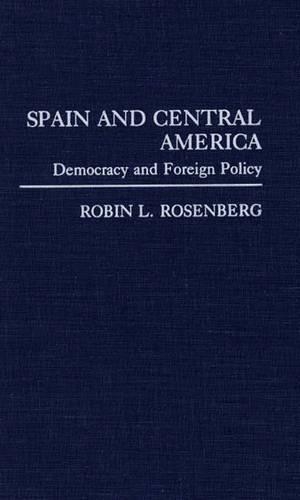
Spain and Central America: Democracy and Foreign Policy
(Hardback)
Publishing Details
Spain and Central America: Democracy and Foreign Policy
By (Author) Robin Rosenberg
Bloomsbury Publishing PLC
Praeger Publishers Inc
30th January 1992
United States
Classifications
Tertiary Education
Non Fiction
International relations
Central / national / federal government policies
327.460728
Physical Properties
Hardback
288
Description
This theoretical and empirical study examines the connection between the image and substance of Spain's democracy and the country's foreign policy in Central America. A linkage is established between Spain's political model of democratic transition and Spanish foreign policy on the isthmus, while questioning the validity of the model as a foreign policy instrument. This case study explores the notion of democracy in Central America, measures Spain's democratic successes and failures against a political model, and examines Spanish foreign policy and the political situation in Central America.
Reviews
"The marriage between theory and case study is particularly commendable. Dr. Rosenberg has tackled an important and complex problem neglected in the literature."-Damian Fernandez Florida International University
In examining Spanish relations with Central America between 1982 and 1991--the period of Socialist Party (PSOE) dominance in Spain and of Central America's greatest political crisis--Rosenberg book assesses the Spanish government's attempt to utilize its transition from authoritarianism to democracy in the post-Franco era as an instrument of foreign policy. In the longer view, the author is analyzing the latest wrinkle in Spain's historic, continuous effort to wield influence over its former colonies without enjoying the resources of a world power. After reviewing appropriate theory, Rosenberg summarizes Spanish initiatives toward Central America and critiques the validity of the model of democratic transition by uncovering the political, economic, and social shortcomings that flawed the democratization process in Spain itself. These problems, combined with the increasing Europeanization of Spain since its entry into the European Economic Community, acted to limit Spanish influence in a region subject to US hegemony. Based heavily on the Spanish press and news magazines, this book deals cogently with a theme whose importance will only increase in the present decade: the foreign policy dimension of democratization.-Choice
"In examining Spanish relations with Central America between 1982 and 1991--the period of Socialist Party (PSOE) dominance in Spain and of Central America's greatest political crisis--Rosenberg book assesses the Spanish government's attempt to utilize its transition from authoritarianism to democracy in the post-Franco era as an instrument of foreign policy. In the longer view, the author is analyzing the latest wrinkle in Spain's historic, continuous effort to wield influence over its former colonies without enjoying the resources of a world power. After reviewing appropriate theory, Rosenberg summarizes Spanish initiatives toward Central America and critiques the validity of the model of democratic transition by uncovering the political, economic, and social shortcomings that flawed the democratization process in Spain itself. These problems, combined with the increasing Europeanization of Spain since its entry into the European Economic Community, acted to limit Spanish influence in a region subject to US hegemony. Based heavily on the Spanish press and news magazines, this book deals cogently with a theme whose importance will only increase in the present decade: the foreign policy dimension of democratization."-Choice
Author Bio
ROBIN L. ROSENBERG is Deputy Executive Director of the North-South Center at the University of Miami, Coral Gables. He has researched this study at length both in the United States and in Spain. He formerly taught at Troy State University and has served in Spain as Adjunct Professor for several institutions.
